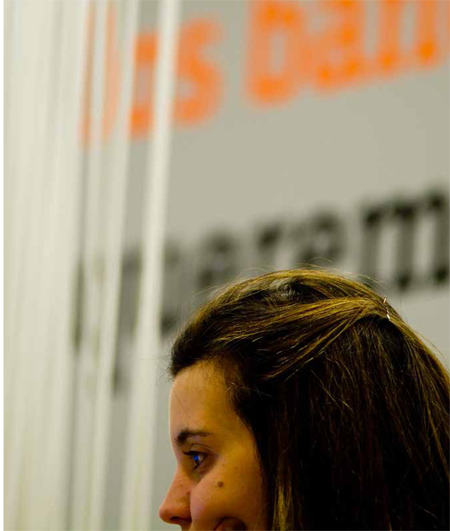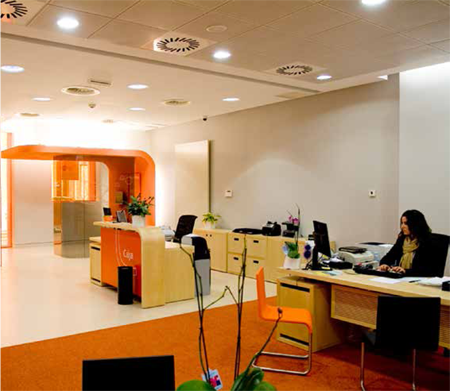In 2015, once again, Bankinter generated employment. 409 people joined the Bank's teams during the year. It is an exceptional circumstance, since no other company in the Spanish banking sector increased staff in a consistent way during the financial year. Since the crisis, the financial sector has been emerged in a process of consolidating and reducing its capacity, which led to the corresponding negative effect on employment. According to data from the Banco de España, between 2008, the year that recorded an all-time high for employees in the sector, and 2014, 70,000 people lost their jobs, that is, 25% of the total. Faced with this trend, Bankinter has generated employment for three consecutive years, and now has a workforce of 4,405 staff.
 Specialists
SpecialistsThe net employment created in 2015 was concentrated mostly on senior and specialised roles that strengthened the departments of Risk and Regulatory Compliance, as well as commercial teams in the Branch Network. Furthermore, new positions strengthened key areas for the company's strategic development, such as Investment Banking and Private Banking. The increase in staff numbers goes hand in hand with the solid evolution of the business, and is also coherent with its expansion projects. Aside from this, the generation of employment forms part of Bankinter's contribution to the Spanish economy, a weak point of which is the job market itself.
The creation of employment is an indicator of the Bank's ambition to increase its resources and turnover. However, Bankinter people management policy goes well beyond simple determination. The search for excellence, the appraisal of merit and the commitment to equal opportunities are some of its distinctive features. The ultimate objective it is to build an all-inclusive framework of activities based on the idea that employees are the principal asset to the company. To maintain this asset, the Bank sets up programmes to recruit professionals, takes care of their training, facilitates improvements to the work environment, stimulates motivation and promotes professional development. Here we will explore how these initiatives pan out.

Bankinter's reputation as an innovative company that looks after its employees is a beacon for professionals in the sector who want to work with the bank, and this facilitates its policy for attracting talent. This positive image has been developed over time, and was confirmed in 2015 with new recognitions, labelling the Bank as a good place to work and grow professionally. The strategy for attracting talent is developed across two key areas:
Senior recruitment. Recruiting professionals with prior experience with other companies. The arrival of such professionals brings new perspective to the Bank, enriching the knowledge of the workforce, and serving as a positive contrast to internal values.
Identifying junior talent. Bankinter carries out an internship programme for students, reserved for fresh graduates and those in the final years of their education, constituting what could be defined as the Bank's youth squad. In 2015, 190 people participated in the programme, and around 6% of these formed part of the workforce. Furthermore, Bankinter promotes agreements with universities and business schools, helping them to complete their graduates' training. Last year saw the first edition of the Master's course in Financial Markets and Banking, organised collectively by the Centro Universiatio de Estudios Financieros (Cunef - the University Centre of Financial Studies) and Bankinter's Corporate University. The programme, which went up to January 2016, deals with a range of topics (as well as strictly academic training, it included paid internships with the Bank), and saw the participation of 26 students.
The axis of training is the Corporate University, which, in 2015, was consolidated as an initiative that not only completes and develops the professional skills and capacities of its employees, but also strengthens the corporate values of Bankinter. Its latest objective it is to improve the company's reputation.
The Bankinter Corporate University was created in 2013 as a strategic tool for creating value and exchanging information at the heart of the organisation. In its almost three years of life, it has reinforced its role as a meeting point for ideas that promote cooperations and facilitate mechanisms for sharing knowledge. Nowadays, a very significant part of the learning process does not come from conventional training, but rather from participating in collaborative settings, such as that offered by the Corporate University.

Its purpose takes place across two platforms:
The physical Campus. This is located in Tres Cantos (Madrid). The Campus has facilities and classrooms with a range of formats and capacities.
The virtual Campus. The virtual space has an increasing importance due to the development of new technologies. It grants access to all employees via the Bank's internal website.
The Corporate University is divided into schools. Thus, on the one hand, it has the Business College, where knowledge that the teams need to have a better understanding of the products and client interaction processes is shared. The Technical Schools ensure that professionals in the company are up to date with projects and new technologies. And, on the other hand, there is the Talent School, where training is given to employees to develop their skills and to support their careers and professional development. The bank has development programmes for young professionals with high potential, who may well take on future positions with great responsibility, as well as programmes for experienced experts and programmes to support functional mobility.
A new feature for 2015 was the Summer School, which was able to lay the foundations of a self-development system, allowing the Bank's employees to access learning materials, on a voluntary basis, for subjects that interest them, such as languages, team management, using tools, commercial techniques and communication, etc.
In 2015, the second edition of the Horizon Programme, which is the axis on which the talent promotion policy is based. Its objectives are two-fold:
Identify people in the organisation with strong capabilities to develop the company's values in the future, and who display leadership potential.
Provide them with training tools and experience, which help their potential to develop fluidly and quickly, and in particular to facilitateimprovements to their personal skills and team management.
Bankinter has another major tool in supporting internal talent, which is the rotation policy or internal mobility. In 2015, 28% of employees were given a new responsibility. It is a very encouraging statistic, given that taking on new challenges and responsibility is an important key in professional development.
Additionally, the bank has a Programme for their near 850 Personnel Managers. The Programme is based around training for people who manage teams, ensuring alignment in management styles and connecting the objectives of each personnel manager with the Bank's culture and values. The company has a map of competences that supports the processes and ensures that the professionals have developed key behaviours, such as being resultsorientated, communicating assertively, being able to manage changes, develop people, work in a team, and having solid skills in leadership, organisation and delegation.
The new People's Website of Bankinter is a key tool for supporting the process of Talent Management, as it facilitates access to information and streamlines processes focused on internal mobility.
Bankinter's evaluation and development system is an annual process that identifies employees with the best performance in the organisation, and designs appropriate professional development plans for them. Its intention is to offer a complete, objective visions of the professional competences and abilities of each employee, providing added value that allows the company to develop the way it behaves.
The person in charge evaluates employees in terms of performance - related to the acquisition of previously established quantitative and qualitative results - and commitment. Both aspects feature an evaluation that is formed from a conversation based around feedback feedback, and ends with a tailored development plan, advice and recommended reading in order to develop the abilities and behaviours identified.
Furthermore, employees and collaborators perform self-assessments to compare the competencies and skills they use in their daily work with the feedback received.
As part of its remuneration policy, Bankinter upholds the principles of nondiscrimination on grounds of gender, race or any other factors, valuing competitiveness and fairness, as well as work performed and results obtained. Accordingly, taking as a reference the basic salary and excluding additional pay for length of service, welfare or other benefits, the male/female pay ratio is 1. The Bank applies a remuneration structure composed of two types:
 1. A fixed portion, which is in influenced by factors such as the function performed, the responsibilities taken on, experience in the position and the ongoing individual performance in the job position.
1. A fixed portion, which is in influenced by factors such as the function performed, the responsibilities taken on, experience in the position and the ongoing individual performance in the job position.
2. A variable portion, designed to be compatible with appropriate and effective risk management and in line with the agreed business strategy. It is applied to the whole workforce, differentiating by functional areas. Groups of employees with a direct business relationshipwith the customer or with an array of different activities have specific bonuses. The rest of employees havevariable incentives, which are granted individually based on the function performed and the responsibilities assumed, but, unlike the fixed portion, its purpose is to ensure an appropriate correlation between the resulting levels of remuneration and the results attained. The amount finally received by each employee, which is capped at a certain maximum amount, depends on the objectives established for each area being met. The development of Earnings Before Tax (EBT) for banking activities has an impact on the variable incentives for all groups.
Bankinter offers corporate benefits that go beyond legal requirements and which apply to all employees. These include:
Bankinter also offers its employees meal subsidies, depending on their working hours, which can be taken as an addition to salary or on the form of restaurant vouchers.
Employees also have right to the following benefits:
There is also a flexible remuneration system,, of a voluntary character, whereby the bank and the employee can agree to modify the composition (not the amount) of the remuneration package, substituting financial remuneration for non-financial remuneration, such as with nursery vouchers, shares, health insurance, training, contributions to pension plans or restaurant vouchers. In this way the employee maximises remuneration in two main ways: through the Bank’s negotiating power to optimise the price and through the tax advantages accruing to certain products or services contracted through this system. Currently 48% of employees use this flexible compensation option.
As long-term remunerationdesigned to cover certain contingencies, the Bank carries out the following actions:
Furthermore, Bankinter forms part of the Plan Familia for Employees. Promoted by the Adecco Foundation, this programme provides any of the Bank's employees who may have any kind of disability, and/or family members in a similar situation, with assistance of various kinds to help them achieve real integration in the workplace and society or to help them perform various activities, including those related to leisure.
Bankinter's all-inclusive people anagement model received several forms of recognition in 2015. Some of the main acknowledgements were:





